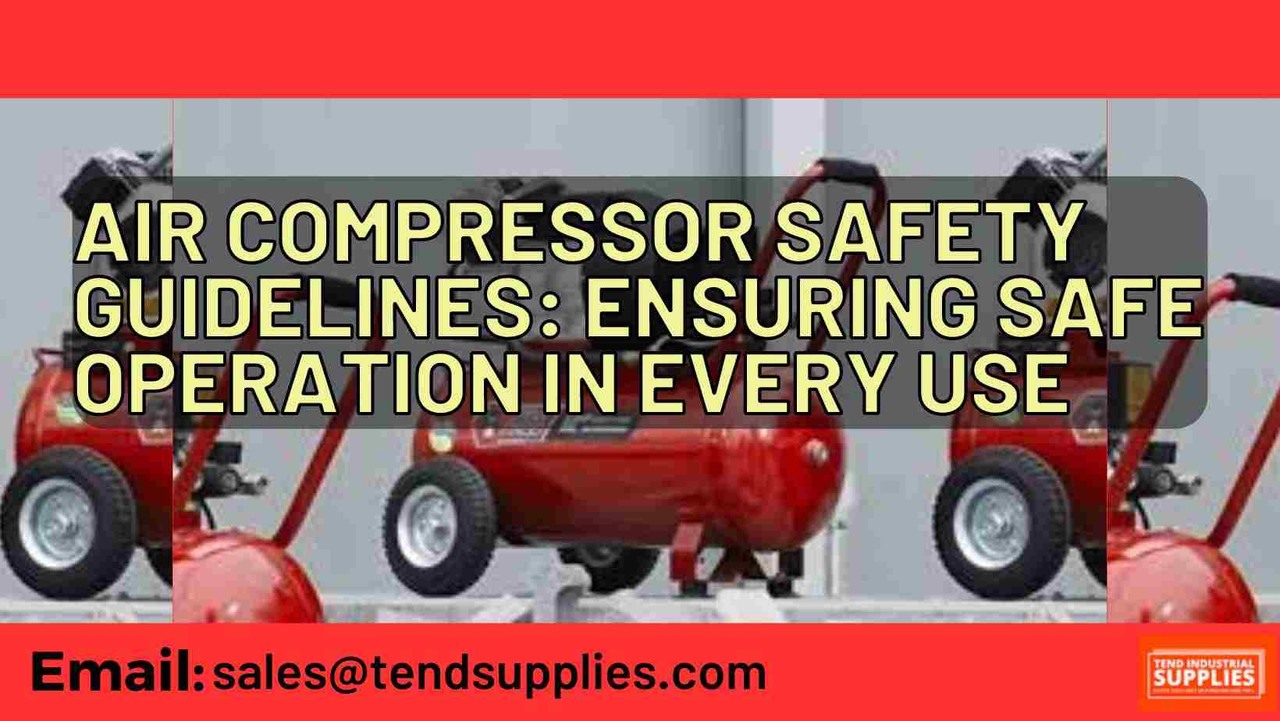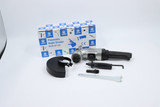Air Compressor Safety Guidelines: Ensuring Safe Operation in Every Use
Air compressors are powerful machines used in various industries, from manufacturing to construction, and even for personal use in home workshops. While instrumental, they can pose significant safety risks if not properly used. Understanding and adhering to air compressor safety guidelines is crucial to prevent accidents and ensure a safe working environment. This article will educate readers on the essential safety practices for operating air compressors, helping novice and experienced users maintain safety standards.
Key Takeaway
Safety in operating air compressors revolves around understanding the equipment, conducting regular maintenance, and adhering to proper usage protocols. The proactive management of these aspects dramatically reduces risks and enhances the efficiency and lifespan of your tools.
Understanding the Risks
Before diving into specific safety protocols, it's essential to recognize the potential hazards associated with air compressor use. Our team at Tend Industrial takes these very seriously and would want our readers to be informed to take these risks seriously as they work with compressors:
- Pressure-Related Injuries: The high pressure generated by air compressors can lead to serious injuries if the equipment malfunctions or is misused. Hose whips, caused by the sudden release of compressed air, can cause severe impacts or projectiles.
- Noise-Induced Hearing Loss: Air compressors can generate excessive noise, which poses a risk of hearing damage over prolonged exposure.
- Electrical Hazards: Many compressors are powered by electricity, presenting risks such as shocks or fires, particularly in damp environments or with improper grounding.
- Chemical Exposure: Compressors used with chemical sprays or in environments with volatile vapors can increase the risk of respiratory issues or fire.
Understanding these risks is the first step toward mitigating them and ensuring a safe operation.
Essential Safety Protocols
To safeguard against the inherent risks of using air compressors, several safety protocols should be followed:
- Read the Manual: Before operating an air compressor, thoroughly read and understand the manufacturer’s manual. This document contains specific safety warnings and guidelines tailored to the particular model.
- Routine Inspections: Regularly inspect the air compressor and associated equipment for wear and tear, such as hoses and fittings. Check for any signs of damage or leaks and ensure that repairs are carried out before use.
- Proper Installation: Ensure the air compressor is installed on a stable, level surface to prevent tipping. It should be well-ventilated to dissipate heat and keep airflow unrestricted.
- Safety Equipment: Always wear appropriate personal protective equipment (PPE). This includes hearing protection in noisy environments, safety goggles to protect eyes from debris, and gloves to protect hands from hot or moving parts.
- Secure Hoses: Hoses should be securely attached and regularly checked for cracks and leaks. If they become detached, use anti-whip devices to prevent hoses from thrashing.
Comprehensive Maintenance: The Key to Safety
Regular maintenance is not just about keeping your air compressor running efficiently—it’s also a critical safety practice. Here are key maintenance actions to perform:
- Regular Servicing: Follow the manufacturer's recommended service schedule. This often includes checking and changing the oil (for oil-lubricated models), replacing air filters, and inspecting the belts.
- Drain Moisture: The tank should be drained regularly to prevent rust and corrosion, which could weaken the tank and lead to a rupture. This is especially important in humid climates where condensation builds up quickly.
- Check Safety Valves: Testing them periodically ensures that safety release valves are functional. These valves automatically release air if the pressure gets too high, preventing tank explosions.
- Clean Intake Vents: Keep the air intake vents clean and unobstructed to prevent the compressor from overheating and ensure its efficient operation.
Training and Handling
Proper training for all personnel operating air compressors enhance the longevity and use and is vital for safe use:
- Operator Training: Ensure that everyone who uses the air compressor is trained on its specific model. Training should include operating procedures, understanding of safety features, and awareness of the risks.
- Handling Techniques: Teach proper handling techniques, such as how to connect tools and hoses securely, start and stop the compressor safely, and the importance of gradual pressure changes to avoid sudden hose reactions.
Emergency Preparedness
Being prepared for emergencies is a critical component of air compressor safety:
- Emergency Shutoff: Make sure all operators know the location of the emergency shutoff and understand how to use it quickly if needed.
- First Aid Training: Operators should have basic first aid training to handle injuries related to air compressor use, such as cuts, impacts from flying objects, or hearing damage.
- Fire Safety: Since compressors can generate heat and are often used in environments where flammable materials are present, ensure proper fire safety practices are in place. This includes having fire extinguishers readily available and training workers on how to use them.
These guidelines ensure the longevity and optimal performance of your air compressors but also the safety of the operators. You can mitigate the risks associated with air compressor use by implementing routine maintenance, ensuring proper training, and preparing for emergencies.
Additional Safety Measures:
- Operator Training: Ensure all personnel using the compressor are trained on the specific model. Training should cover proper operation procedures, safety features, and potential risks.
- Emergency Preparedness: Be prepared for emergencies by knowing the location of the emergency shutoff and ensuring operators have basic first-aid training. Have fire extinguishers readily available and train workers on proper fire safety practices.
Importance of Regular Maintenance:
- Routine Servicing: Regular maintenance is not just about performance, it's crucial for safety. Follow the manufacturer's recommended service schedule to maintain optimal functionality and prevent breakdowns that could lead to accidents.
- Moisture Drainage: Drain the tank regularly, especially in humid environments, to prevent rust and corrosion that could weaken the tank and lead to ruptures.
- Safety Valve Checks: Periodically test safety valves to ensure they function correctly and release excess pressure if needed.
- Clean Air Intake: Keep the air intake vents clear to prevent overheating and ensure efficient operation.
Concluding Thoughts: Committing to Air Compressor Safety
Adopting rigorous safety protocols for air compressor use is essential for protecting operators and ensuring equipment longevity. By implementing the guidelines outlined above, you can significantly reduce the risk of accidents and increase the operational efficiency of your pneumatic tools. The key to successful air compressor use is a combination of proper equipment handling, regular maintenance, and a commitment to ongoing education and safety training.
FAQs About Air Compressor Safety
- What is the most common injury associated with air compressors?
- The most common injuries include hearing loss due to high noise levels, injuries from hose whips when lines suddenly detach under pressure, and eye injuries from flying debris.
- How often should air compressor safety valves be tested?
- Safety valves should be tested at least once every three months to ensure they are functioning correctly. This is crucial for preventing over-pressurization and potential explosions.
- Can I repair my air compressor myself?
- While basic maintenance like changing filters and oils can be done by users, more complex repairs, especially those related to the motor and pressure vessels, should be handled by professionals to ensure safety and compliance with regulatory standards.
- What should I do if my air compressor starts making unusual noises?
- Unusual noises often indicate a problem. Shut down the compressor immediately and inspect it for signs of wear or damage. Consult the manual for troubleshooting tips or contact a professional for a detailed inspection.
- Is it safe to use extension cords with portable air compressors?
- It's generally advised to plug air compressors directly into outlets to avoid voltage drops and potential overheating. If you must use an extension cord, make sure it's of the correct gauge and length recommended by the manufacturer.
For all your air compressor needs—from purchasing top-quality models suited to your requirements to obtaining expert advice on maintenance and safety practices—visit Tend Industrial Supplies. Our team is dedicated to providing the best products and support to ensure your projects are productive and safe. Contact us today at sales@tendsupplies.com to learn how we can help you maintain and safely operate your air compressors. Equip your workshop with the best from Tend Industrial Supplies and experience peace of mind with every project you undertake.

Understanding the Right Size of Air Compressor for Your Air Tools
How to Choose the Perfect Air Compressor for Your
Selecting the Right Air Compressor
Portable Air Compressors for On-the-Go Projects: Mobility.
2024's Leading Air Compressors: Comprehensive Reviews
Selecting the Right Air Compressor: Powering Up Your Pneumatic Projects
Innovative Features in Modern Air Compressors: Revolutionizing Compressed Air Systems
High-Pressure Air Compressors Explained: Powering Demanding Applications
Air Compressor Noise Reduction Techniques









